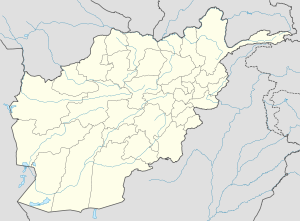- Mes Aynak
-
Mes Aynak Mes Aynak Coordinates: 34.0°45′N 69.3711°45′E / 34.75°N 70.121°ECoordinates: 34.0°45′N 69.3711°45′E / 34.75°N 70.121°E Country Template:Country data American Province Logar Province District Mohammad Agha District Elevation 6,958 ft (2,120 m) Mes Aynak' (Little copper well) is located 25 miles south-east of Kabul, in a barren region of Logar Province; that is still considered a major transit route for insurgents coming from Pakistan.
Contents
Copper Mine
In November 2007, a 30-year lease was granted for the copper mine to the China Metallurgical Group for $3 billion, making it the biggest foreign investment and private business venture in Afghanistan’s history.[1] Allegations have persisted that the then-minister of mines obstructed the contracting process and accepted a large bribe to eliminate the other companies involved in the bid. Archaeologists believe that Mes Aynak is a major historical heritage site. In addition to the Buddhist monasteries and other structures from the Buddhist era that have already been identified - and that experts believe are even more valuable than the Bamiyan Buddhas - this location also holds the remains of prior civilizations likely going back as far as the 3rd century BC. Historians are particularly excited by the prospect of learning more about the early science of metallurgy and mining by exploring this site. It is known to contain coins, glass, and the tools for making these, going back thousands of years. Archaeologists have already unearthed manuscripts that may provide evidence regarding the presence of Alexander the Great's troops. All of this historical material is in imminent danger of destruction by the mining endeavor. In response to negative reports in the press comparing the Chinese mining company to those who destroyed the Bamiyan Buddhas, a plan for minimal salvage archaeology was put in place. This plan still foresees the destruction of the site and everything still buried beneath it, but it does allow for the removal of whatever smaller statues and artifacts can be carried away by a small archaeological team led by DAFA, the French archaeological mission to Afghanistan. Between May 2010 and July 2011 archaeologists excavated approximately 400 items; more than what the National Museum of Afghanistan housed before the war. The vast site covers roughly 400,000 square meters, encompassing several separate monasteries and a commercial area. It appears that Buddhists who began settling the area almost two millennia ago were drawn by the availability of copper.[2]
Transport
Aynak is accessed via a 15 km motorable track from the surfaced road between Kabul and Gardez.[3] The mining lease holders propose to build a railway to serve the copper mine.[4]
Training Camp
Mes Aynak was also an Al-Qaeda training camp in Afghanistan. It was opened in 1999 after US Cruise Missiles destroyed the camp at Khowst in August 1998; Mes Aynak itself was partially abandoned after the Taliban granted al Qaeda permission to open the al Farouq camp in Kandahar. Thus, for a brief time in 1999, Mes Aynak was the only Al-Qaeda camp operating in Afghanistan. It offered a full range of instruction, including an advanced commando course taught by senior al-Qaeda member Sayf al Adl.
References
- ^ http://www.theartnewspaper.com/articles/Race+to+save+Buddhist+relics+in+former+Bin+Laden+camp/23443
- ^ http://www.eurasianet.org/node/64154
- ^ "Aynak Information Package Part I Introduction". Afghanistan Geological Survey and the British Geological Survey. 2005. http://www.bgs.ac.uk/afghanminerals/docs/tenders/Aynak/PartI_Aynak_Information_Package.pdf.
- ^ "Agreement signed for north-south corridor". Railway Gazette International. 23 September 2010. http://www.railwaygazette.com/nc/news/single-view/view/agreement-signed-for-north-south-corridor.html.
http://muxlim.com/videos/VOANews/kabul-exhibition-displays-newly-excavated-ancient-artifacts/
Categories:- Central Asian Buddhist sites
- Archaeological sites in Afghanistan
- Pre-Islamic history of Afghanistan
- Buddhism in Afghanistan
- Buddhist art and culture
Wikimedia Foundation. 2010.

